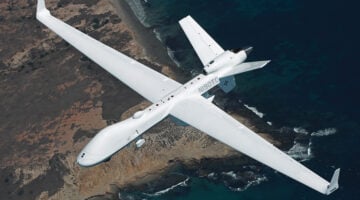
WASHINGTON: A prominent lawmaker who helps oversee the Space Force’s budget is tired of hearing about the service’s new dress uniforms and wants its leadership to focus more on developing cutting-edge satellites and rockets.
Rep. Jim Cooper, who chairs the House Armed Services Committee’s strategic forces subcommittee, admonished the service to “step up its game” during the Politico Defense Forum on Thursday.
“I wish we were reading in the papers more about killer new satellite systems instead of killer uniforms or big bold headquarters,” said Cooper, a Tennessee Democrat. “We’ve got to make sure that our technology is state of the art. In fact, we need to be a couple of decades ahead of our near peer adversaries.”
Cooper said he believes the Space Force has the budget it needs to succeed but is still moving too sluggishly. Meanwhile, Russia and China continue to make “extraordinary” advances in space technology while spending “pennies on the dollar” compared to the US, he said.

The Space Force was not the only military space organization that drew criticism from Cooper. The congressman also had harsh words for Derek Tournear, director of the Space Development Agency, who also spoke during the Politico event.
The SDA, a Defense Department organization that will transfer to Space Force control in 2022, has a mandate to leverage existing commercial technologies and field constellations of hundreds of small satellites. Those technologies are expected to augment the Space Force’s communications and missile tracking capabilities.
Tournear said he would like to see the SDA be a “fast follower” that can take advantage of technological advances in the commercial space world and field new capabilities every other year.
“We’ve been very successful as an independent agency,” he said. “And I believe we will continue to be successful — even as we fall under the Space Force — as long as we are given enough authorities and autonomy to maintain that ability to acquire systems quickly.”
But Cooper pushed back on Tournear’s vision of a successful SDA, saying that the Space Force needs to be thinking bigger.
“To offer our warfighters new tech every two years, that may sound good, but my guess is that sounds slow to [SpaceX founder] Elon Musk, or Jeff Bezos, or small companies like relativity space that are now 3D printing their own rockets, something heretofore unimagined by our Air Force and other [Defense Department space organizations],” he said.
Cooper was an early advocate for forming a separate military service for space. In 2017, he and Rep. Mike Rogers, R-Ala., proposed forming a “Space Corps” that would sit under the Department of the Air Force.
The hope was that a new service would be better able to advocate for a larger share of the defense budget and would be able to more quickly develop and launch advanced space technologies if it wasn’t encumbered by the Air Force’s larger bureaucracy and overhead. That idea was eventually repackaged by former President Donald Trump, who called for a “Space Force” and signed a law establishing the new service in December 2019.
At a separate space-focused conference in St. Louis this week, a chorus of military officials have highlighted the need to work more closely – and more quickly – with commercial industry to field new technologies as rapidly as possible.
Cooper said that so far, it hasn’t been enough.
“We’ve got to be tougher, faster, bolder. And I’m really not seeing that like I would like to see,” he said.

